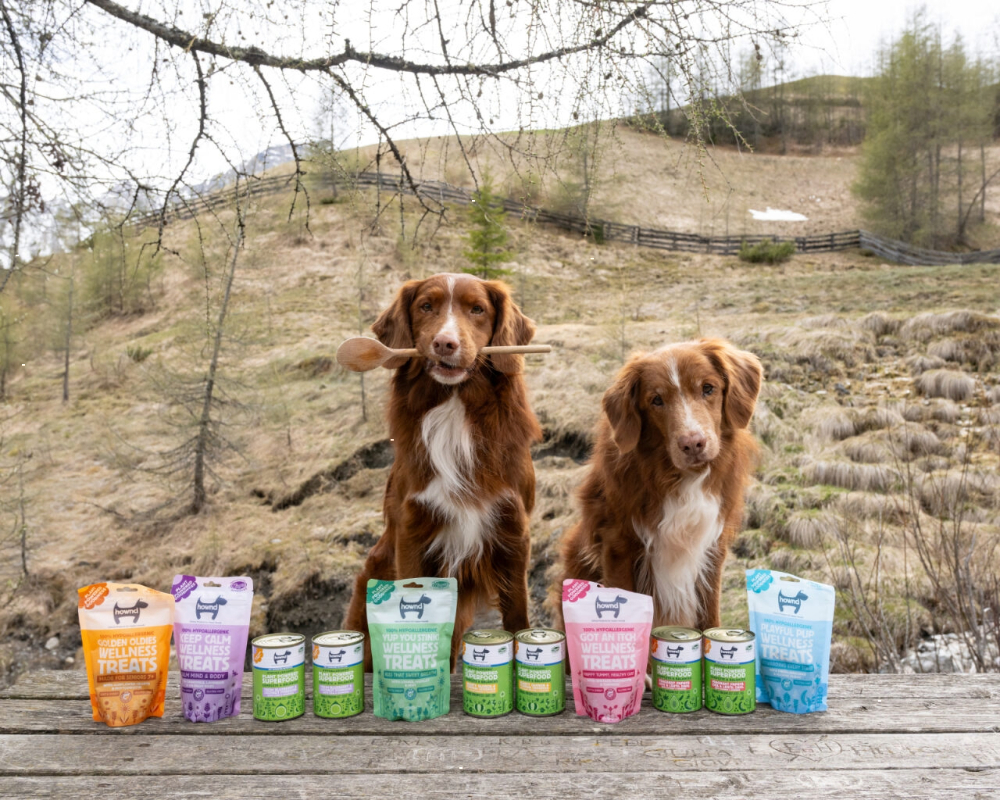
In recent years, plant-based diets have shifted from being a niche lifestyle choice to a mainstream movement. With growing concerns about health, sustainability, and animal welfare, more people than ever are turning to plant-based eating. In fact, around 10% of the UK population now follows some form of plant-based diet (The Vegan Society, 2025). Social media challenges, food trends, and initiatives like Veganuary, which continues to break records year after year, have all helped fuel this momentum. Interestingly, many participants who join for just one month often find themselves sticking with plant-based eating well beyond January (Veganuary, 2024).
Naturally, this shift in human diets has started to extend to pets as well. Pet owners who want their values to align with their lifestyle are now asking an important question: Can dogs thrive on a plant-based diet too? The move toward plant-based dog food reflects not only ethical and environmental motivations but also growing interest in canine health and wellness. When carefully formulated, plant-based diets can support dogs’ nutritional needs, improving digestion, easing allergies, managing weight and even boosting energy level.
But is a plant-based diet safe for all breeds and life stages? And are there situations where it might not be the best fit? In this blog, we’ll explore the benefits, potential challenges, and considerations of feeding your dog a plant-based diet, helping you make an informed decision about whether it could be the right choice for your furry companion.
Dogs are Omnivores, Not Carnivores
Over time, dogs have evolved into highly adaptable omnivores, capable of thriving on both animal and plant-based foods. This flexibility has been essential for their survival, especially during times when food was scarce, allowing them to adjust their diet to whatever was available. Unlike their wolf ancestors, domestic dogs have developed unique physiological traits that enable them to maintain health and strength on a varied omnivorous diet, suggesting that a well-balanced plant-based diet could also meet their needs.
When most people think of protein for dogs, they associate it with meat. However, numerous plant-derived sources, such as lentils, chickpeas, peas, quinoa, and soy, provide high-quality protein and essential amino acids that support muscle development and metabolic function. Dogs can also synthesise certain amino acids, such as taurine, internally, which allows them to thrive on a balanced plant-based diet. Additionally, they efficiently convert beta-carotene from vegetables like carrots into active Vitamin A, supporting vision, muscle integrity, and nervous system health. Their ability to digest complex carbohydrates and utilise glucose from fruits, legumes, and grains further supplies a steady energy source for cellular and neurological processes.
So, with all these evolutionary advantages, the question remains: can dogs go completely plant-based?
Breed and Size Considerations
When deciding whether to transition your dog to a plant-based diet, it’s essential to consider their specific nutritional needs. Factors such as age, breed, and size all influence what your dog requires to stay healthy and energetic. Every dog’s metabolism and nutrient absorption differ, so understanding your dog’s unique dietary requirements is the first step to making an informed and beneficial change.
Large Breeds:
Large breed dogs, such as Dalmatians, Boxers, Labradors, Border Collies, and Great Danes, tend to have unique dietary challenges. They are more prone to skeletal and joint problems, including hip dysplasia and arthritis, due to the strain their body weight places on their bones and joints. For this reason, monitoring calcium and phosphorus levels in their diet is crucial, as too much or too little can contribute to developmental or bone-related issues.
In plant-based diets, many natural ingredients can help support these concerns. For example:
- Turmeric contains curcumin, a compound known for its anti-inflammatory properties that can help ease joint pain and stiffness.
- Yucca root can reduce inflammation and may even help decrease unpleasant stool odours, a bonus for pet owners!
- Cinnamon has antioxidant and anti-inflammatory effects, which may support joint health and digestion.
- Kale, broccoli, and Bok choy are excellent plant-based sources of calcium, helping maintain strong bones and teeth.
- Legumes such as lentils and chickpeas are rich in complex carbohydrates and protein, providing energy and muscle support.
Large breed dogs also benefit greatly from fibre-rich foods, which promote healthy digestion and can help manage weight. Ingredients like pumpkin, oats, peas, and brown rice can support regular bowel movements while keeping your dog feeling full for longer, reducing the risk of overeating and obesity-related conditions.
When feeding a vegan or plant-based diet to a large breed dog, it’s absolutely vital to ensure nutritional completeness. Dogs require specific amino acids (like L-carnitine, taurine, and methionine) and vitamins (such as B12 and D3) that are sometimes harder to obtain from plants alone. HOWND’s Complete Food, which not only includes natural superfoods but also contains essential nutritional additives, such as vitamins, minerals, and amino acids, creates a fully balanced and wholesome vegan meal for your dog.
Small breeds:
Small breed dogs such as Chihuahuas, Shih Tzus, Yorkshire Terriers, and Toy Poodles may be tiny in size, but their nutritional needs are anything but small. These dogs have faster metabolic rates than larger breeds, meaning they burn energy quickly and require nutrient-dense meals rich in high-quality protein to support their active bodies. Whether they’re darting around the house or constantly on alert, their muscles and tissues rely on a steady supply of amino acids for repair and maintenance.
Plant-based protein sources such as lentils, chickpeas, peas, quinoa, and soy provide complete or complementary amino acid profiles that help sustain lean muscle mass and overall metabolic health. Including a mix of these proteins ensures small breeds get the building blocks they need for energy production, immune function, and tissue repair.
While carbohydrates and healthy fats remain valuable for balanced nutrition, proteins play a central role in keeping small dogs strong and resilient. Slow-digesting carbohydrates from vegetables like sweet potatoes, pumpkin, and butternut squash provide additional energy and fibre for digestive health, while plant-based fats from chia, flax, and sunflower seeds contribute omega fatty acids that support heart and brain function.
Whole grains such as brown rice, oats, and barley, or gluten-free options like quinoa, can round out the meal by maintaining steady energy between feedings. Because small breeds are prone to low blood sugar (hypoglycaemia), offering smaller, protein-rich meals multiple times a day helps stabilise energy levels and keeps them alert, active, and thriving.
Active working breeds:
Active and working dogs, such as Border Collies, Huskies, German Shepherds, Retrievers, and Sheepdogs, have incredibly high energy demands. Whether they’re herding livestock, running agility courses, or accompanying you on long outdoor adventures, these dogs rely on a diet that provides sustained energy, strong muscle support, and optimal recovery. Their bodies are constantly burning fuel, which means nutrition plays a vital role in keeping them healthy, focused, and performing at their best.
Working dogs require a diet rich in high-quality protein to maintain and repair muscle tissue. Plant-based sources like lentils, chickpeas, peas, quinoa, and soybeans are excellent alternatives to animal proteins, offering a full spectrum of amino acids when combined correctly. To ensure complete nutrition, look for foods that are fortified with key amino acids such as taurine, L-carnitine, and methionine, which are essential for muscle function, heart health, and endurance. The perfect choice for active and working dogs is HOWND’s Plant Powered Superfood, a complete meal made with high-protein, nutrient-rich ingredients and fortified with essential vitamins, minerals, and amino acids to support strength, stamina, and overall well-being.
These breeds also benefit from nutrient-dense vegetables and superfoods that provide essential vitamins and minerals. Ingredients like spinach, kale, carrots, and sweet potatoes deliver antioxidants that help protect against oxidative stress, a common issue for active dogs that expend a lot of energy daily. Adding omega-3 and omega-6 fatty acids from plant-based sources such as flaxseed oil, chia seeds, and hemp oil helps maintain joint flexibility, a shiny coat, and healthy skin, all while reducing inflammation caused by strenuous activity.
Puppies:
Puppies are in the most critical growth stage of their lives, a time when every nutrient counts. Their developing bodies require a precise balance of amino acids, vitamins, minerals, and healthy fats to support rapid growth, muscle development, and brain function. Because their immune systems, bones, and organs are still forming, it’s especially important that their diet provides complete and balanced nutrition to set them up for a lifetime of good health.
While plant-based diets can absolutely meet a puppy’s nutritional needs, it can be challenging to achieve the right nutrient balance through homemade meals alone. Many essential nutrients, such as taurine, L-carnitine, vitamin B12, calcium, and vitamin D3, are harder to source naturally from plants in the correct amounts. That’s why a complete plant-based puppy food is often the best option for young dogs, as it ensures they get everything they need in carefully balanced proportions.
Equally important are Omega-3 fatty acids, which play a key role in brain development, eye health, and skin condition. While many traditional diets rely on fish oils, plant-based diets can provide these essential fats through marine algae, a clean and sustainable alternative. Omega-3s derived from algae have the same DHA and EPA benefits that help young puppies develop sharp minds, healthy skin, and glossy coats.
For an extra nutritional boost, HOWND’s Playful Pup Wellness Treats are an excellent choice. Made with marine algae and other natural superfoods, they’re specially designed to support brain development, immune health, and active play in growing puppies. Not only are they delicious and rewarding, but they also deliver vital nutrients that complement a balanced diet, helping your puppy grow into a strong, happy, and energetic adult dog.
Senior dogs:
As our beloved dogs enter their senior years, their bodies naturally begin to slow down. They may not run or play as much as they used to, and their metabolism starts to change, meaning they burn fewer calories and can gain weight more easily. For this reason, it’s important to adjust their diet to focus on high-fibre, lower-calorie meals that still deliver all the essential nutrients needed to maintain strength, mobility, and overall well-being.
Weight management is one of the key priorities for senior dogs. Carrying extra weight can put added pressure on their joints, heart, and internal organs, which can lead to mobility issues and health complications. Diets rich in fibre, from ingredients like pumpkin and sweet potato, help your dog feel full and satisfied while supporting healthy digestion. A fibre-rich diet also helps regulate bowel movements, which is important for older dogs as their digestive systems become less efficient over time.
Senior dogs also benefit from plant-based proteins that are easy to digest and gentle on the stomach. Ingredients such as lentils, peas, and quinoa provide clean sources of protein without excess fat, helping to maintain lean muscle mass even as activity levels decrease. Maintaining muscle tone is crucial for joint stability and mobility, especially in older dogs that may be prone to arthritis or stiffness.
In addition, joint-supportive superfoods like turmeric, yucca root, and hemp seed can help reduce inflammation and promote comfort. These natural anti-inflammatories are excellent plant-based alternatives to synthetic supplements. Senior dogs can also experience declines in immune function, so including antioxidant-rich ingredients like blueberries, spinach, and carrots can help strengthen their natural defences. Vitamins such as C, E, and B-complex, along with minerals like zinc and magnesium, are essential for maintaining vitality and supporting healthy skin and coat.
A great option for senior dogs following a plant-based lifestyle is HOWND’s Golden Oldies Wellness treats, which are specially formulated for older companions. It includes easily digestible ingredients, natural anti-inflammatory ingredients, and ingredients to promote joint health, digestion, and long-term wellness.
Health and Allergy Benefits
Plant-based diets can offer a wide range of benefits for dogs, and for some, they may even be essential for their health and well-being. Many dogs suffer from allergies or intolerances to common animal products such as chicken, beef, or dairy, which can lead to symptoms like skin irritation, digestive upset, and chronic inflammation. A carefully formulated plant-based diet can help reduce or eliminate these allergic reactions, providing relief and improving overall comfort.
HOWND takes extra care to create hypoallergenic foods and treats specifically for dogs with these sensitivities, combining nutrient-rich ingredients that are gentle on the digestive system while still being delicious and satisfying. Beyond allergy management, plant-based diets are associated with several other health benefits, including improved digestion, healthier skin and coat, stronger joints, and better weight management.
However, while plant-based diets can be highly beneficial, there are some important considerations. Ensuring that a dog’s diet is complete and nutritionally balanced is critical. Dogs require a full spectrum of amino acids, vitamins, and minerals, nutrients that are naturally abundant in meat but may need to be carefully sourced or supplemented in plant-based foods. Without proper formulation, deficiencies could affect energy levels, growth, immune function, and overall health.
So, is it safe for dogs?
In short, yes, plant-based diets can be safe and highly beneficial for dogs, provided they are nutritionally complete and carefully balanced. From puppies to seniors, and across small, large, and active breeds, dogs can thrive on a plant-powered diet that supports energy, joint health, digestion, and overall well-being. Key nutrients like essential amino acids, vitamins, minerals, and omega-3s must be included to ensure your dog receives everything they need for growth, maintenance, and vitality.
Before making any dietary changes, it’s always wise to consult with your veterinarian, especially if your dog has allergies, health concerns, or special nutritional requirements. With professional guidance, you can confidently introduce a plant-based diet that meets your dog’s unique needs.
For a complete, balanced, and delicious plant-based option, check out HOWND’s full range of meals and wellness treats. Explore products like HOWND Playful Pup, Plant Powered Superfood, and Golden Oldies Treats, designed to support dogs at every life stage.
Want to learn more about plant-based nutrition for dogs? Don’t miss our blogs on allergy-friendly diets, specific breed nutrition, and tips for active and senior dogs.







